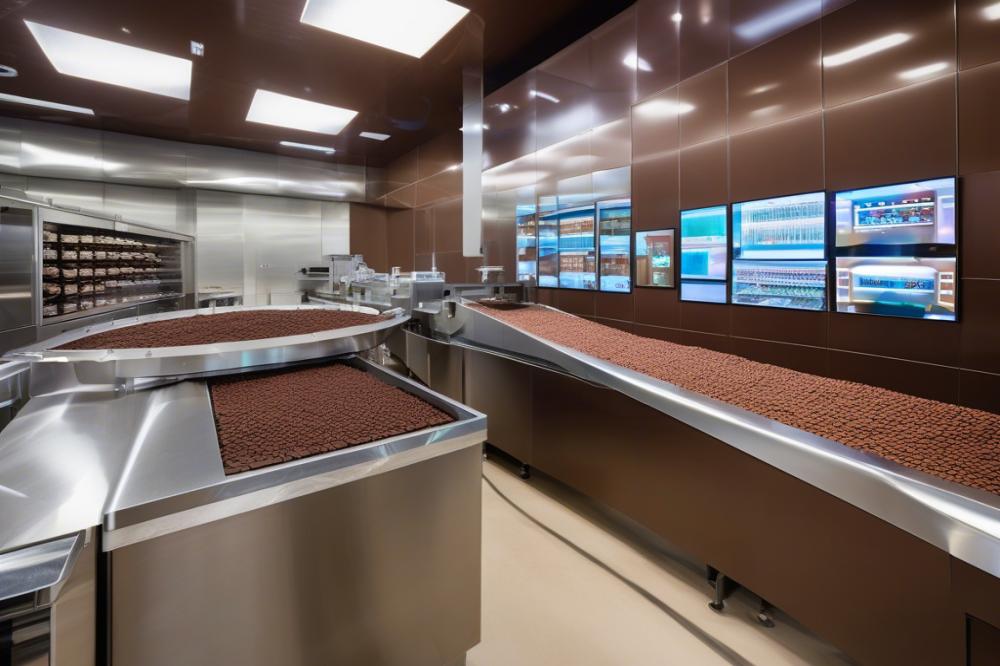The Role of AI in Streamlining Chocolate Production
The chocolate industry is experiencing a period of significant transformation. Many manufacturers are exploring innovative technologies to enhance their processes. The demand for high-quality chocolate continues to rise, pushing producers to find ways to meet consumer expectations. As this demand grows, so does the necessity for improved production efficiency and strict quality control. Balancing these two aspects can often be challenging.
Manufacturers face pressure to maximize production yield while maintaining flavors and textures that chocolate lovers adore. Efficient chocolate processing becomes vital for survival in a competitive market. Traditional methods often hinder these goals, leading to waste and lower profit margins. Enter artificial intelligence—a game-changer in this landscape.
AI in chocolate production encompasses various applications. Machine learning and data analysis play key roles in refining processes and managing resources. For instance, predictive maintenance can help prevent equipment failures before they occur. This proactive approach reduces downtime and keeps production lines running smoothly.
Supply chain optimization is another area where technology shines. Intelligent systems can enhance ingredient sourcing by analyzing trends and availability. Not only does this benefit cost-efficiency, but it also contributes to timely deliveries. Automation in chocolate manufacturing is no longer a luxury; it’s a necessity.
In conclusion, artificial intelligence holds great promise in transforming the chocolate industry. By streamlining production processes and ensuring quality control, producers are setting themselves up for success. This integration of advanced techniques might very well define the future of chocolate production.
AI in chocolate production

Artificial intelligence plays a significant role in the world of chocolate production. It involves using computer systems to perform tasks that usually require human intelligence. This includes activities like data analysis, machine learning, and even decision-making. Clearly, AI offers a modern approach to enhance various stages of chocolate processing.
Benefits of Integrating AI Technologies
Integrating AI technologies can greatly boost production efficiency. It allows manufacturers to speed up their processes while maintaining high standards. This means less waste during production, leading to a higher production yield. Quality control also vastly improves. AI detects defects and inconsistencies far quicker than the human eye. With timely interventions, companies can address issues before they escalate, thus preserving their brand reputation.
Moreover, predictive maintenance becomes possible with AI. Machines can analyze data to predict when a failure may occur. This proactive strategy reduces downtime and enhances productivity. In factories, every moment counts; AI ensures that operations run smoothly without unexpected halts.
Examples of AI Applications in Chocolate Manufacturing
Many chocolate manufacturers are already harnessing the power of AI. For instance, companies use machine learning algorithms for ingredient sourcing. They analyze past data to determine which suppliers provide the best quality at the most reasonable prices. By optimizing their supply chain, manufacturers can cut costs and improve their products.
Another fascinating application is in flavor development. Advanced software can predict consumer preferences based on data analysis. This aids companies in crafting products that resonate with their target audience. Additionally, AI algorithms can simulate how different ingredients blend together. This process allows for faster formulation of new chocolates.
In packaging, AI technologies excel as well. Image recognition software inspects packaging for damages or defects. An automated system can then reject poor-quality items before they leave the factory. Such precision and attention to detail significantly enhance overall product quality.
Artificial intelligence is indeed a game-changer for chocolate production. As companies adopt these technologies, they set themselves up for future success and innovation. Each application of AI can lead to smarter methods, ensuring the industry continues to thrive.
Enhancing Production Efficiency

Artificial intelligence is revolutionizing the way chocolate is made. Machine learning plays a vital role in optimizing workflows within chocolate processing. By analyzing historical data, it identifies bottlenecks and predicts the best times to operate machinery. This leads to smoother production schedules and fewer delays.
Moreover, improving production yield becomes more accessible through diligent data analysis. Factories can examine every step of the chocolate-making process. With the insights gained, manufacturers can adjust methods and ingredients to maximize output. When every ounce of cocoa is utilized effectively, profits can soar.
Automation of Repetitive Tasks
Automation can take on the burden of repetitive tasks. Workers who once spent hours on mundane jobs can now focus on quality control and creative aspects of chocolate production. This shift not only boosts worker morale but also significantly impacts output consistency. By reducing human error, the final product can achieve a uniform taste and texture.
Predictive maintenance becomes possible with AI tools as well. Equipment can signal when it needs repairs, preventing downtime that disrupts the flow of production. Such foresight helps maintain a steady supply chain, keeping chocolate supplies timely and dependable. As a result, customers receive products when expected, enhancing satisfaction.
Ingredient sourcing benefits tremendously from advanced technologies too. Machines can analyze market trends and availability of key ingredients. With precise information, companies can make informed decisions that lower costs and increase supply efficiency. Whether it’s sourcing cocoa or other additives, streamlined processes lead to better products.
Investing in these innovative technologies ultimately changes the landscape of chocolate production. It’s incredible how the integration of machine learning and AI drives industry growth. The time for chocolate manufacturers to embrace these advancements is now. Those who do will likely see significant improvements in productivity and profitability.
Quality Control and Assurance

AI-driven Quality Control Measures in Chocolate Production
Artificial intelligence plays a vital role in chocolate processing. Many manufacturers now rely on machine learning to monitor product consistency. This technology can analyze various parameters, ensuring every batch meets high standards. Automated systems can detect even minor deviations in texture or flavor. By integrating AI, companies decrease human errors in quality checks. Machines can work faster and more accurately than humans, which contributes to better outcomes.
Utilizing Real-Time Data Analysis for Maintaining Product Standards
Real-time data analysis transforms how chocolate makers operate. Sensors deployed throughout the production line gather crucial information. These sensors record temperatures, humidity levels, and mixing times continuously. With this data, companies can quickly identify any issues that arise. Adjustments can be made almost instantly, which increases production efficiency. Maintaining consistent quality becomes less of a challenge. The ability to track performance in real-time allows manufacturers to act swiftly and effectively.
Case Studies of Companies Leveraging AI for Quality Assurance
Several firms are leading the way in using AI for quality control. A well-known chocolate brand implemented predictive maintenance to avoid equipment failures. With AI monitoring their machines, they can predict when maintenance is needed. This proactive approach minimizes downtime and maintains high production yield. Another case involves a specialty chocolatier that uses data analysis for ingredient sourcing. By analyzing feedback and sales data, they adjust recipes to meet customer preferences. These case studies illustrate the diverse applications of AI in the industry. Embracing technology leads to significant advantages in quality assurance.
Predictive Maintenance and Reliability
Artificial intelligence plays a crucial role in the predictive maintenance of chocolate production machinery. It helps identify potential equipment failures before they happen. By analyzing data from various sensors in the machines, AI can pinpoint issues that might affect performance. This type of data analysis leads to improved reliability and reduced unexpected breakdowns. Maintenance teams can receive alerts about equipment needing attention, allowing them to act proactively.
Reducing downtime is vital for any production process. When machines stop, the entire production line can come to a halt. That’s costly. Implementing AI-driven predictive maintenance can significantly cut these interruptions. Studies show it can lead to a 30% reduction in downtime. Fewer unexpected breakdowns also mean lower maintenance costs. Companies spend less money on repairs and can invest more in growth. Higher production efficiency allows for better product quality as well.
Real-World Examples of Successful Predictive Maintenance Implementations
Several companies have harnessed these technologies with tremendous success. For instance, a well-known chocolate manufacturer utilized machine learning algorithms to analyze data from their mixers and conching machines. By continually monitoring these machines, they noticed patterns that indicated when maintenance was needed. They dramatically improved production yield and quality control through these insights.
Another case involves a small chocolate processing facility. They adopted AI tools for ingredient sourcing and production tracking. These tools predicted when machinery would need repairs, allowing workers to plan maintenance during off-peak hours. As a result, this facility saw an increase in their overall efficiency and product output. Achieving these benefits demonstrates how businesses can thrive by embracing predictive maintenance technology.
Supply Chain Optimization
Artificial intelligence plays a critical role in ingredient sourcing for chocolate production. Manufacturers often rely on various suppliers for cocoa, sugar, and other components. Using machine learning, businesses can analyze data from multiple sources to find the best prices and quality. This reduces costs and enhances production efficiency.
Data-driven decision-making has transformed how chocolate producers operate. Identifying trends in ingredient availability helps companies prepare for challenges. For example, if a region faces drought, AI can alert producers to find alternative suppliers in advance. Adapting to these changes quickly is vital for maintaining quality control and keeping production on schedule.
Logistics management is another area where AI excels. Tracking shipments in real-time provides transparency in the supply chain. When delays happen, AI analyzes the situation and recommends solutions. This ensures chocolate producers can pivot quickly, minimizing disruption to their operations.
Inventory management also benefits significantly from AI integration. Predictive maintenance tools help monitor equipment and raw materials effectively. Chocolate manufacturers can predict when to reorder ingredients based on production yield and demand. This leads to less waste and better resource allocation.
In sum, the integration of artificial intelligence into the chocolate supply chain streamlines various processes. By leveraging data analysis, producers can optimize every step from ingredient sourcing to final delivery. The result is a more efficient operation that meets consumer expectations consistently.
Wrapping Up the Sweet Future of Chocolate Production
The impact of artificial intelligence on the chocolate industry has been remarkable. From sourcing raw materials to refining flavors, this technology has changed how chocolate is made. Increased efficiency and quality control are just a couple of benefits. Producers can now monitor processes in real-time, ensuring consistency and reducing waste. Many companies are already reaping the rewards of using advanced algorithms to optimize production schedules and quality checks.
Looking forward, trends indicate that AI will continue to revolutionize chocolate processing. There may soon be smart sensors on machines that can detect changes in texture and taste. These innovations could lead to even greater personalization, allowing brands to create customized chocolate products for individual consumers. Moreover, collaboration between tech experts and chocolatiers could spark new ideas. A deeper integration of AI could enhance flavor profiling and improve the entire supply chain from farm to table.
Industry stakeholders must recognize the potential of these technologies. They should embrace the innovations to stay competitive in the market. Training staff to work alongside AI systems will be crucial. Building partnerships with tech companies can provide valuable insights and resources. As the industry evolves, being proactive about technology adoption will benefit everyone involved. The chocolate of tomorrow could be sweeter, smarter, and more efficient than ever. Don’t miss the chance to be part of this transformative journey.



